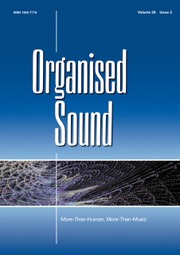Searching for lost data: outlines of aesthesic–poietic analysis
Published online by Cambridge University Press: 07 June 2004
Abstract
Fifty years down the line, the analysis of computer music is still a very complex issue, highly dependent on the identity of computer music itself: the variety of software, the lack of a common musical notation for scores, the absence or presence of computer data. This has led to the emergence of a multitude of analytical methods, including aesthesical analysis, which approaches music from the point of view of perception, and poietical analysis, which pays attention to the creative process.
This study aims to combine these two methods of analysis in order to understand the relationship between technology and the actual piece of music. The article presents a methodological approach – focused on six pieces produced at IRCAM in Paris and at CSC in Padua, between 1975 and 1985 – via an in-depth consideration of Mauro Graziani's Winter leaves, a work conceived in 1980 at the CSC using Music360. The method used consists of comparing data collected using a diversity of practices: repeated listening, the tracing of graphical schematics, sonogram and spectrogram analysis, data listing analysis. An algorithm has also been created in order to calculate the degree to which the software is exploited and to enable a comparison between the different analyses. It is hoped that this procedure will combine traditional musicological methods with new approaches suited to the medium and grounded in a thorough knowledge of computer technology and musical environments.
Information
- Type
- Research Article
- Information
- Copyright
- © Cambridge University Press 2004
Footnotes
- 3
- Cited by

